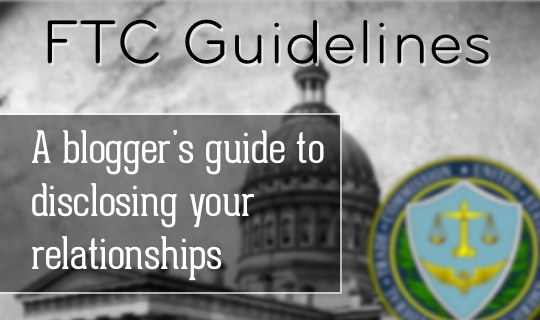
Have you run a giveaway on your blog? If so, there might be a chance that the promotion you’re involved with is tied to a brand or business you’re working with. And hey – that’s fine! We estimate that over half of the giveaways run through Rafflecopter are promotions associated with a sponsor company in some way, shape, or form.
If you’ve run or entered giveaways sponsored by brands, that also means that you might be familiar with the below phrasing (or some variation of it):
The opinions expressed above are 100% my own. I am disclosing this in accordance with the FTC’s 16 CFR, Part 255: “Guides Concerning the Use of Endorsements and Testimonials in Advertising.”
Ugh… lawyer speak. *cringes* :{ And that’s where we’re turned off.
Nonsense! Not only are these FTC guidelines written in clear English and easy to absorb, it’s something every blogger should be aware of, especially if they feature brand partnerships on their blog.
Today, FTC blogger guidelines are going to be explained in a way we can all understand. We’ll highlight what the FTC is, how it has evolved over the past 100 years, what you should know as a blogger, and some strategies to use these guidelines to your advantage.
A 100-Yard Overview: What is the FTC?
First – the basics. The FTC (Federal Trade Commission) is an independent agency of the US government that enforces laws that help protect consumers from deceptive acts brought on by individual companies. In addition, the FTC is also responsible for preventing anticompetitive business practices.
So… that’s good right? You bet.
The FTC protects consumers from companies. Without the FTC, your evening meals might be constantly interrupted by telemarketers and your local drug stores would still be claiming that their new supplements can cure the common cold. Not good.
The FTC Mission Statement: To Prevent Business Practices that Are Anticompetitive, Deceptive, or Unfair to Consumers
The History Of The FTC: 1914 – Present

Flashback: The year is 1914. Edison invents the telescribe. The same year Woodrow Wilson forms the FTC to “bust the trusts”.
Fast-forward: The year is 2012. Everyone’s tweeting about when the iPhone 5 is going to be released.
A lot has changed over the past 100 years. From newspapers, to radio & television, to telephones, and finally, the internet, the way consumers absorb content from competing businesses has changed.
As the internet has evolved over the past several decades, the FTC has been quick to follow. In today’s world, the FTC plays a role by helping protect your inbox as well as your online privacy.
But we’re bloggers. The blogosphere grows each day. As a marketing channel, blog outreach and influencer marketing are becoming a real force to be reckoned with. As more brands get more creative trying to figure this whole internet marketing thing out, more and more bloggers are being approached to be included in a brand’s next marketing campaign. To understand how the FTC plays a role in overseeing these relationship, the topic at hand is an update to FTC’s rule book that happened in 2009 called “FTC 16 CFR Part 255.”
Bloggers As Brand Endorsers: FTC 16 CFR Part 255
In October of 2009, the FTC updated its guides concerning the use of endorsements and testimonials in advertising in a document titled FTC 16 CFR Part 255. This document addresses emerging media channels on the web, specifically bloggers.
You can read the entire document here (it’s not a bad read if you have several hours… seriously). But if you don’t have time and want a quick summary, here’s how we interpret these new FTC endorsement guides:
Look… we’ve always had rules and regulations in place to make it clear when a promoter has a sponsored affiliation with a company. We’re just now recognizing that blog outreach and other similar emerging media channels are here to stay, and should be subject to these rules, too.
Simple, right? But rewind to several years ago when these guidelines were released, and you might have heard horror stories of bloggers being sued or read an article of how this was the end of the blog outreach era all because of this update.
It’s all baloney.
Unfortunately, this 2009 update wasn’t communicated effectively to the blogging world. To help stop the bleeding, the FTC came through with a video and Q&A guide on their site that helps clear things up.
But What Does a “Relationship” Consist Of?
In the paragraph above, we said “if you have a relationship with a…”. Yeah, but what’s a relationship, exactly? Good question.
Besides checking out the Q&A on their site, the FTC has been helpful by listing different scenarios that help answer this question. Here’s one of the many examples:
A consumer who regularly purchases a particular brand of dog food decides one day to purchase a new, more expensive brand made by the same manufacturer. She writes in her personal blog that the change in diet has made her dog’s fur noticeably softer and shinier, and that in her opinion, the new food definitely is worth the extra money. This posting would not be deemed an endorsement under the Guides.
Assume that rather than purchase the dog food with her own money, the consumer gets it for free because the store routinely tracks her purchases and its computer has generated a coupon for a free trial bag of this new brand. Again, her posting would not be deemed an endorsement under the Guides.
Assume now that the consumer joins a network marketing program under which she periodically receives various products about which she can write reviews if she wants to do so. If she receives a free bag of the new dog food through this program, her positive review would be considered an endorsement under the Guides.
The example above was taken directly from the revised endorsements and testimonial guides, which features 30+ scenarios similar to the one above.
Turning The FTC Guidelines Into An Opportunity
Still got yourself down about these guidelines? C’mon – don’t fret! Every blogger has to disclose this information; you’re not put at any disadvantage. If you have a case of the ‘FTC blues’, here are three suggestions to help you turn your woes into an opportunity.
1) Prove To Your Readers That You’re Honest
This is why these regulations were put in place to begin with. Take pride in the fact that you’re emphasizing honesty with your readers. With each reference to the FTC guidelines in your blog, you’re building a sense of trust.
From your perspective as a reader, would you be more upset at a) reading an article where the blogger disclosed their relationship with a sponsor or b) reading an article where the blogger tried to hide the fact that they had a working relationship with the company?
You can also make the argument that sponsored posts might be an alternative to banner ads. Do you think your readers would be more interested in a sponsored post or being served another adsense widget in your sidebar? Poll them and find out!
2) Prove Yourself Knowledgable To Your Sponsors
Having a conversation with a company or brand that is new to the blogosphere? Making them aware of these guidelines makes you look more professional.
We’ve seen it happen more often than you think: reputable brands aren’t always aware of these regulations. Catching them up to speed shows that you’ve been working in the space for a while. You might be surprised how appreciative they are when they find out that you can provide an opinion in the matter.
3) Prove Your Creativity To The World
Turn the FTC guidelines on its head and get creative. How? Take the same concept discussed in this video below about how companies have turned 404 pages into another chance to build a better relationship with their visitors:
It’s 2012: We’re All Celebrities On The Internet – Be Transparent!
While celebrities might have been a brand’s influential go-to twenty years ago, the idea that anyone can create influence by blogging means that bloggers have the chance to step into the main spotlight.
Thanks to blogging, any individual now has the opportunity for their voice to be spread far and wide. The FTC guidelines described in this article are meant to help us manage this shift. Keep your readers in the know about the relationships you’ve created with your sponsors, and you’re in the clear.
How do you disclose your brand relationships to your readers? Let us know in the comments below!

Pingback: FitDesk: Be Productive While Working Out {Giveaway}()
Pingback: The Best Relationship Stories − Your Questions About Virgo Men Personalities()
Pingback: 12 Most Sexy Critical Thinking Skills for Social Media()
Pingback: Liveblogging the FTC Workshop on Native Advertising | Geoff Livingston's Blog()
Pingback: Do's of Blogging {Part 2} - Busy Being Jennifer()
Pingback: Understanding Social Media Endorsement Guidelines Imposed by the FTC | Impact of Social Media on the Legal Profession and the Law()
Pingback: Legal Resources()
Pingback: The Business Of Beauty Blogging | Social Media Tutorials()
Pingback: New Blogger Series: Running a Giveaway()